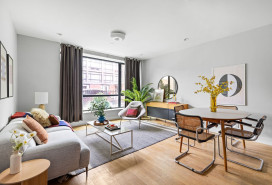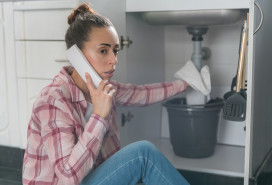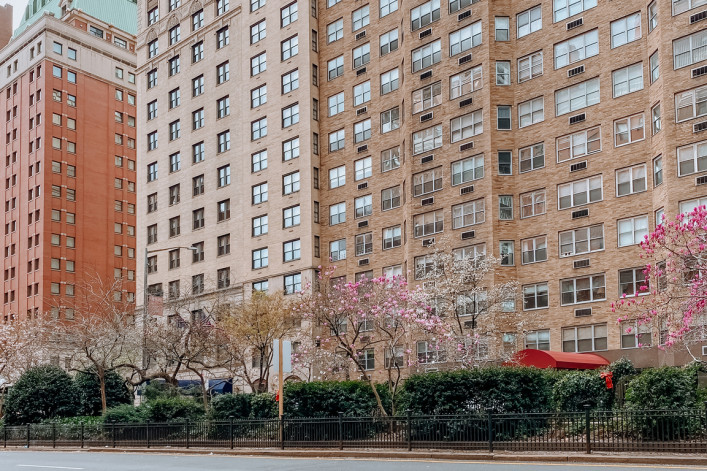















Find Your
Next Place

Living above, below, and next to other New Yorkers means lots of noise. Here's how to deal with specific situations.
Are your noisy New York City neighbors driving you crazy? Maybe they're playing loud music—or you're hearing fighting or abuse and wondering how to deal with it. In NYC’s densely populated buildings, it can be a struggle to concentrate if you work from home or are just trying to enjoy some downtime in your apartment.
The first tip is not to address a noise problem while it's happening (unless you fear someone's life is at stake—then you should call 911). You're more likely to come off as hostile and use words you'll regret. It's a good idea to k eep a record of the problem and reach out to other neighbors who might be dealing with the same issues. You can also try to dampen the sound from inside your own apartment and involve the landlord or building management company if needed.
For more suggestions for specific NYC neighbor noise scenarios, read on.
[Editor's note: A previous version of this post was published in January. We are presenting it again as part of our summer Best of Brick week.]
The most effective approach is to address your neighbor in a spirit of collaboration. One conspiratorial approach is to blame the noise on the building's thin walls, treating it as an issue that affects everyone—and keep the focus off of the individual offender. That said, you'll want to be clear about what noise you are talking about so they know to stop.
Keep in mind that a landlord or owner is required to keep your apartment safe and livable at all times and excessive noise is one of the conditions they have to address under the warranty of habitability. Find out more here: "What is a warranty of habitability?"
There's strength in numbers, so get together with your neighbors. If the noise is an issue throughout the building, or at least on your and adjacent floors, you will have a good chance of being able to address it. Read: "I'm organizing my neighbors and negotiating with our landlord to pay half our rent."
For more vertical etiquette tips, Brick Underground's Ms. Demeanor column has plenty of advice on how to tackle specific noise issues in NYC apartment buildings. Start here: "Dear Ms. Demeanor: My neighbors blast their television all night! How do I get them to lower the volume?" Also : "Dear Ms. Demeanor: The noise from our downstairs neighbor is making us miserable. What can we do?"
Find out if you can ask your neighbor to install more carpeting. Most rentals and co-ops insist 80 percent of the floor has some kind of covering, either carpets or rugs, but it's not always easy to get a neighbor to comply. Read: "Can I force my noisy neighbors to get more carpeting?"
For your own part, you can try improving your own insulation with rugs or drapes. Other options include pulling out some noise-canceling headphones or plugging in a white noise machine. For more tips r ead: "Brick Underground’s best advice on how to deal with bad neighbors."
Documenting the issue is an important part of evaluating and addressing it. When it's a noise issue, you should also record the sound. Although this won't help in the moment, it gives you back some control and will be important in presenting your grievances either to your neighbor or landlord. Read: "8 ways to make peace with your neighbors."
A first step is to start tracking when the noise is happening. Keeping a calendar posted in your kitchen so you don't have to go digging it out every time your neighbor fires up her floor-to-ceiling guitar amp is one trick Wagner suggests to clients. Another thing that can help build your case is talking to other neighbors to see if they're affected. If the issue is your upstairs neighbor practicing a clog-dancing routine every Tuesday night like clockwork, odds are your next-door neighbors aren't going to care. But if it's booming bass from that same neighbor's side gig as a techno producer, you may have some allies, and whichever route you take next, there's strength in numbers.
Before suing your building and/or your neighbor, you're also going to need some proof of the problem beyond your jotted notes. That means hiring an expert to measure the sound levels over time. And, Wagner says, "Getting an expert is going to be expensive."
You may be hearing something more serious than just noise. You may be hearing domestic violence. Here are some resources for domestic and gender-based violence survivors during the pandemic and domestic violence shelters are open for intake. Read: "I think I'm overhearing domestic violence next door. What should I do?"
If a neighbor threatens you—know that New York state law defines harassment as any conduct intended to annoy, threaten, intimidate, or alarm another person. If that sounds like your situation, there are steps you can take—including calling the police if you are ever physically in danger. Read: "Is your neighbor harassing you? 4 steps to handle the problem." Also read: "My downstairs neighbor harasses me for being gay—and my building just renewed his lease." [Editor's note: The neighbor moved out soon after the article published.]
If you are weighing whether to continue to live in your apartment you may be able to negotiate to end your lease early.
Breaking your lease isn’t without risks so approach this with your landlord carefully and get legal help if necessary. Check out: "I want to break my lease because of a noisy NYC neighbor. What are my options?"